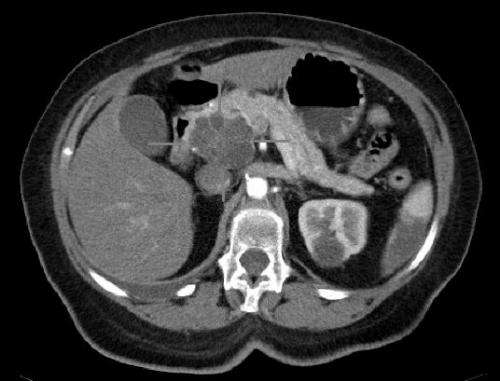Artificial intelligence brings pancreatic cancer screening one step closer to reality

Artificial intelligence (AI) holds promise for enabling earlier detection of pancreatic cancer, which is crucial to saving lives. The potential of AI is showcased in a study to be presented at the ESMO World Congress on Gastrointestinal Cancer, 1–4 July 2020.
Overall, 12 in every 100,000 people develop pancreatic cancer. This means that screening everyone would be inefficient and would expose many people to unnecessary tests and potential side-effects. Between 70-80% of patients are diagnosed at an advanced stage when it is too late for curative treatment and five years after diagnosis, just 6% of patients have survived.
Screening helps identify cancer early, when treatments are most effective, thus improving survival. There are two main requirements for screening. First, a screening test that is easy to perform and has few side-effects. Second, a defined group that would benefit most from screening because they are at higher risk. For example, breast cancer screening involves mammography in women aged 50 to 71 years. AI could be the desperately needed answer to define a group of higher risk individuals that would benefit from screening, especially as recently some promising results have indicated that non-invasive tests for pancreatic cancer may soon be available.
It is known that patients who develop pancreatic cancer consult their general practitioner (GP) with non-specific symptoms such as gastrointestinal problems or back pain more frequently in the months and years prior to diagnosis compared with their peers who do not develop pancreatic cancer. Individually, these symptoms are unlikely to trigger further investigations for cancer. Researchers came up with the idea that AI could find a combination of these non-specific symptoms that is linked with higher risk of contracting the disease, which would be difficult to spot by GPs.
This preliminary study used electronic health records from GP practices in the UK. The analysis included 1,378 patients aged 15-99 years diagnosed with pancreatic cancer in 2005 to 2010. Each patient was matched by age and sex to four people who did not get pancreatic cancer. Information on symptoms, diseases, and medications in the two years prior to diagnosis were used to create a model predicting who would develop pancreatic cancer. "We used AI to study a large volume of data and look for combinations that predict who will develop pancreatic cancer," said study author Dr. Ananya Malhotra, research fellow in statistics, London School of Hygiene & Tropical Medicine, London, UK. "It's not possible for the human eye to recognize these trends in such large amounts of data."
The pilot study found that in people under 60 years of age, the model could predict who was at higher risk of pancreatic cancer up to 20 months before diagnosis. "Our model has estimated that around 1,500 tests need to be performed to save one life from pancreatic cancer," explained Malhotra. "This is unlikely to be small enough to make screening viable just yet. However, it shows that AI holds potential to narrow down the number of people we need to screen. We should be able to reduce this quite a lot further by matching pancreatic cancer patients to controls from the general population, which is what we plan to do next (in the current study, the controls had other types of cancer)."
"Pairing this predictive model with a non-invasive screening test, followed by scans and biopsies, could lead to earlier diagnosis for a significant proportion of patients and a greater number of patients surviving this cancer," added Malhotra.
Using AI to identify people at high-risk of pancreatic cancer up to 20 months earlier could make the difference between life and death. "This should be enough time to screen for pancreatic cancer, then proceed with diagnosis and treatment in patients with a positive screening test," said Dr. Angela Lamarca, consultant in medical oncology, The Christie NHS Foundation Trust, Manchester, UK. "Early diagnosis in pancreatic cancer gives the highest chance of cure."
According to Lamarca, GPs could use this type of AI model on their medical records to highlight patients at higher risk. An alarm could be raised showing who should receive screening. She said: "We need bigger studies incorporating AI tools into daily clinical practice and exploring the benefit of screening the patients selected by AI. More research is also needed to find a good screening test for these high-risk patients."
More information: DOI: 10.1016/j.annonc.2020.04.028
















